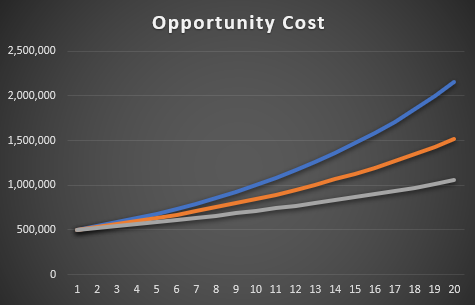Are you starting out in property investment or perhaps looking to expand your existing portfolio?
What fee will you choose to pay?
Hopefully none, I hear most people say.
But be careful…in my mind there are 3 fees you could end up paying over the life of your property journey.
While some are obvious and paid-up front, it can quite often be the less obvious fees that may cost you dearly.
Even more concerning is that to the untrained eye, there may appear to be no cost at all, particularly if pride and ego clouds your judgment.
I felt it was important to outline my top 3 fees that all property investors could pay,
Here are my thoughts.
The Built In Fee
The old saying comes to mind here - “there is no such thing as a free lunch” and that is certainly the case here.
It is usually the salespeople or spruikers offering a once in a lifetime opportunity that sounds too good to be true.
Most of these opportunities are often brand new, dual occupancy or off the plan apartments and the whole process does not cost you a cent……. or does it?
Beware the shiny brochures, champagne launches, rental guarantees, slick sales offices and other false prophecies.
You are paying a fee for all of this, on top of the kickbacks and commissions for all and sundry.
It is all built into the purchase price.
These are the reasons we see valuations rarely stacking up for these types of properties, often coming in anywhere from 5% - 20% below the contract price.
On a $1million purchase that means you could be giving the developer anywhere from $50,000 - $200,000 and that should be your money- not his.
Quite the “learning fee” don’t you think?
Opportunity Cost
The “opportunity cost” fee is the one that we most regularly come across.
Despite the alarming number of statistics highlighting just how badly the majority get it wrong, many investors continue to go it alone.
For most a property purchase is an event (they just buy a property they like – usually close to home) rather than a process – meaning it’s not part of a long-term strategic approach.
These types of investors always start with “the property” first and then work backwards.
The chances of finding an investment grade asset with wealth producing rates of return are a long shot when you don’t have a long term strategy and a framework for reaching your end goal.
We also see existing investors looking to buy their next property, when their first step should have been to assess their existing asset base.
Taking one step sideways to ensure it fits into their “end game” strategy, so they can then move two steps forward.
It can be difficult to admit that we got it wrong and easier to hold onto an asset in the hope its time will come…… some day!
“It isn’t costing me anything” they always proclaim.
Pride, ego and emotion can get in the way of making a logical and rational decision.
Just 1% or 2% growth better growth per annum may sound like an insignificant amount, but just look at the difference it makes over decades.

A $500,000 Property compounded at : 4% vs 6% vs 8% pa
The results can be gobsmacking, with the learning fee running well into the hundreds of thousands of dollars, even millions in some cases.
Up-Front Fee
Then there is the up-front fee.
The concept being that you pay someone a learning fee before you just jump in.
Preferably someone who has been there, done that and as they say, wrote the book.
You pay them to ensure you get efficient and effective results, in the shortest possible time frame.
Your independent strategist can assess your situation and provide a solution and as a result they are paid to help you arrive at the outcome.
When you learn to drive you do not just start driving, you learn from someone like a parent or an instructor who has probably been driving for decades.
It really should not be any different when it comes to property investing.
You’ve heard me say that it can take up to 30 years to become wealthy through property, and this is partly because most people spend the first 10 years making mistakes.
The upfront fee you pay t your strategist is the learning fee your pay for avoiding similar mistakes and the years in lost time.
You’ll find the most expensive advice you get is free, and the best value advice you’ll get will cost but stop ou making the common mistake the average investor makes – and this is worth a fortune.
In Summary
The reality is that all property investors end up paying a learning fee of some sort.
It is usually the uneducated investors and the ones that try to go it alone that pay the highest fees.
If you think about it… you can either pay the market or your strategist.
By not taking early advice from a professional, investors ultimately pay a much greater cost.
It may be the built-in fee of brand new, dual occupancy or off the plan that appears to cost nothing, until settlement day when the valuation does not stack up or growth is non-existent.
For others it may be selecting or holding and underperforming asset.
It may not appear to be costing them anything, but when compared to an asset that outperforms, the opportunity cost could be hundreds of thousands of dollars.
Many investors will continue to go it alone and just focus on buying a property, any property without any real due diligence.
For those looking to build multi-generational wealth over the longer term, they understand the need to have a professional by their side.
Someone to create a long-term plan, targeting the end game and working backwards following a process, then finally selecting the right property that fits within that plan.
Some would argue you can not put a cost on having direction and certainty, direct your end goal in a timely and efficient manner.
Which fee will you choose to pay?
.....................................................
 Brett Warren is a director of Metropole Properties in Brisbane and uses his 18 plus years property investment experience and economics education to advise clients how to build their portfolios.
Brett Warren is a director of Metropole Properties in Brisbane and uses his 18 plus years property investment experience and economics education to advise clients how to build their portfolios.
He is a regular commentator for Michael Yardney's Property Update.
Disclaimer: while due care is taken, the viewpoints expressed by contributors do not necessarily reflect the opinions of Your Investment Property.